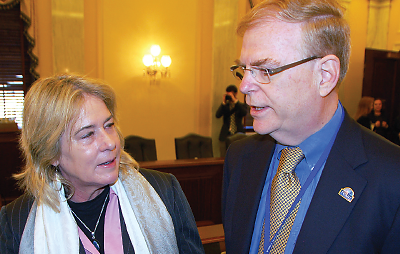A bipartisan group of senators voiced concern about the slow pace of change in the Veterans Health Administration’s (VHA) mental health care system during a hearing in Washington, D.C., in November—a concern intensified after listening to two women whose sons, veterans of the wars in Iraq and Afghanistan, had died by suicide.
“When people are hurting, they don’t want to wait to get help,” emphasized Senate Committee on Veterans’ Affairs Chair Bernie Sanders (I-Vt.).
Ultimately, the senators, veterans, family members, and VHA officials in the room agreed that easier access and less bureaucracy would help those seeking care.
“The senators see the issues squarely and have the perspective we do,” said the VHA’s chief mental health services consultant, psychiatrist Harold Kudler, M.D., in an interview with Psychiatric News after the hearing.
Sanders went on to ask how the $5 billion already authorized for hiring additional clinicians was being spent by the VHA.
Those funds were not specifically allocated for hiring mental health providers, replied Kudler. The agency was nevertheless using some of the money to recruit more mental health clinicians, increase points of access, and test new modes of outreach in rural areas.
The number of veterans receiving mental health care rose from 900,000 in Fiscal 2006 to 1.4 million in Fiscal 2013, Kudler said. VHA facilities now include 150 medical centers, 820 community-based outpatient clinics, and 300 vet centers. The agency employs 21,158 full-time-equivalent employees providing direct mental health care, including 2,444 hired since March 2012.
The VHA also employs 300 suicide-prevention coordinators at its facilities around the country, and its suicide hotline for veterans and military service members has fielded 1.25 million calls over seven years, he said.
The testimony was presented in consideration of the Clay Hunt SAV Act, which includes measures for suicide prevention and medical school loan forgiveness for psychiatrists and certain other practitioners. APA has worked closely with veterans’ organizations such as the Iraq and Afghanistan Veterans of America to advocate for passage of this legislation.
Still other avenues could be explored to reduce suicide among veterans, said psychiatrist Elspeth Cameron Ritchie, M.D., M.P.H., a retired Army colonel and now chief clinical officer of the Washington, D.C., Department of Behavioral Health. She was also a member of an Institute of Medicine panel that studied the effectiveness of treatments for posttraumatic stress disorder.
That report found that there were many sources of care for service members and veterans in the Department of Defense and the VHA, but that tracking and research were inadequate to evaluate the success of these efforts.
In the same vein, the VHA should conduct more research to understand which of its patients are most likely to die by suicide and what drives them to take that step, said Ritchie. The VHA should also screen for toxic exposures—like Agent Orange or the antimalarial drug mefloquine—which might produce psychiatric or suicidal symptoms, she said. “And we need to consider ‘moral injury,’ which contributes to suicidality,” said Ritchie. “It is related to PTSD, but has more to do with survivor’s guilt and existential anguish at killing and seeing others die.”
The feelings of shame and guilt that are part of moral injury may contribute to suicide and other problems and should be acknowledged in the therapeutic relationship, she said.
Several senators also asked about the “overmedication” of patients. Some veterans have complained that psychotropic drugs are doled out as a substitute for other kinds of therapy, they said.
“The VHA is not generally overusing medications,” replied Kudler. “Reliance on medication alone is a mistake. The therapeutic relationship is more powerful than any medicine.”
Finally, if there was one other overriding but unspoken theme hovering in the hearing room, it was the need for community on the part of the veterans and the people in their lives. Several recent veterans told the senators that they had survived the transition back to civilian life because of the close connections they developed with unit mates and other veterans.
“The best thing that happened to me was connecting with fellow Iraq and Afghanistan vets,” said Marine MSgt. (ret.) Vincent Vanata, who went from Iraq to his home in Cody, Wyo., in three days in 2003. He struggled with the aftereffects of war for years until he attended a retreat sponsored by Project Odyssey, a part of the Wounded Warrior Project, in 2012.
“There, I was able to connect with 15 other warriors and for the first time realized that I was not alone,” he told the senators.
These connections illustrated for Vanata the importance of peer support in assisting veterans and their families and helping them heal from the often invisible wounds of war, he said. ■
A link to written testimony presented at the November 19 Senate committee hearing can be accessed
here.

